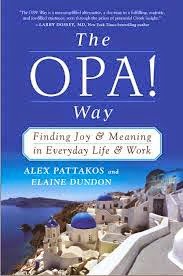Link to buy The OPA! Way: Finding Joy & Meaning in Everyday Life & Work
Story Rating: 3.5 out of 5
Review:
The premise behind The OPA! Way is that the Greek
people have a unique approach to life that helps bring meaning to their daily
activities. People around the world have a great deal to learn from this Greek
philosophy, and by adopting the Greek approach, everyone's life can be
improved. The word OPA! as a twofold meaning. First, it's a traditional Greek
word that commonly expresses "joy, excitement, and inspiration." For
the purposes of this book, it's also an acronym that represents the three
components of the Greek philosophy of life: Others, Purpose,
Attitude.
While researching The OPA! Way, authors Alex
Pattakos and Elaine Dundon travelled through small towns in Greece and talked
with the people they met. This research allowed them to identify key
characteristics of the Greek way of life. They concluded that one shouldn't
waste time chasing material wealth or professional success or even something as
fleeting as happiness. Instead, personal fulfillment comes from living a life that
has meaning. That can only be achieved through connecting with others in satisfying
personal relationships (Others),
being a positive force in the world (Purpose),
and feeling content with what one has (Attitude).
This book presents a rather simplistic way of
looking at both an entire culture and life in general, but the authors get
points for enthusiasm. They clearly have great admiration for Greece and her
people. The book is full of stories taken directly from their interviews with
Greek citizens that highlight the tenets of The OPA! Way. The stories
demonstrate how wise the Greek people are and how much can be learned from
them. The book's authors also offer frequent quotes from Greek philosophers
like Plato and Democritus that show how The OPA! Way has been a central part of
Greek life for thousands of years.
One central element of the OPA! Way is that a
person must have the right attitude in order to get the most out of life. By
the same token, it's probably best to have the right attitude toward this book
in order to get the most out of it. Unfortunately, this reviewer had difficulty
adopting the appropriate attitude.
While authors Pattakos and Dundon take a utopian
view of Greece, it was difficult for this reviewer to completely forget about
the protests, strikes, and violence that erupted in Greece in the wake of its
recent financial crisis. It wasn't addressed in the book, but in 2012,
austerity measures were passed by the Greek legislature that increased taxes,
decreased government spending, and reformed labor laws. The steps were
necessary to save Greece from economic collapse. Many Greeks didn't want to lose
their government-funded benefits, though, and they fought back – hard. Throwing
pipe bombs at police doesn't seem like the behavior of a relaxed populace
that's more interested in establishing meaningful personal connections than amassing
material wealth. The contradiction was hard to ignore.
Overall, this is an interesting book with
thought-provoking stories and quotes. There's certainly something to be gained
here. Just don't fall into the trap of believing that any society is without
its problems. No matter where we're from, we're only human, after all.
Reviewed by Peter


No comments:
Post a Comment